The Tight Relationship Between Fit And Frugal
Share the post
Share this link via
Or copy link

Source: blackCAT / Getty
I used to be 20 pounds overweight, and always almost broke. I understand that 20 pounds isn’t that much, and almost broke is better than actually broke. But the important thing here is not how severe either element was – the excess weight or the deficit of money – but rather the very close relationship between the two. It’s often overlooked, but when your finances get worse, your fitness often takes a hit, and visa versa. Our gut and our emotions are constantly communicating. Many people with irritable bowel syndrome or other digestive conditions can tell you that their symptoms get so much worse when they are stressed. So that’s one way in which our finances can constantly impact our stomachs. But there is so much more to it than that. We have this interesting relationship with spending and eating. We have yet another fascinating relationship when it comes to our sense of self-worth and how it ties to these two numbers: the one we see on the scale, and the one we see in our bank accounts. I remember thinking, when I was a bit overweight, “It’s just my luck that I’d gain weight at the same time I’m having money problems.” I thought it was an unlucky coincidence, but there was no coincidence about it. Here is a look at the tight relationship between being fit and frugal.
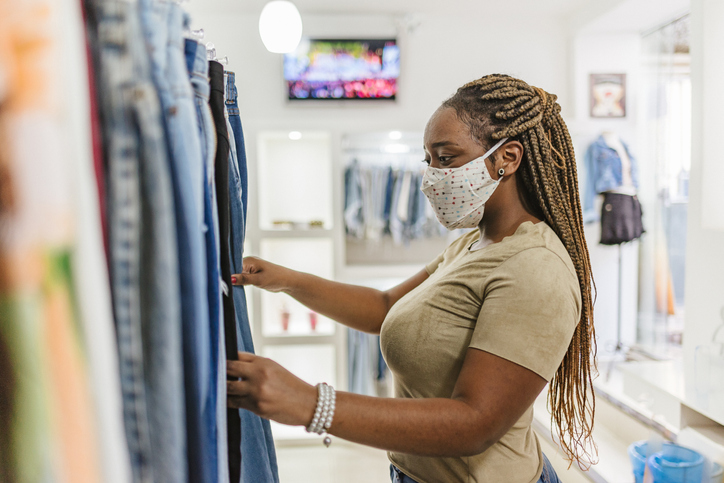
Source: Igor Alecsander / Getty
We shop when we’re stressed
It’s all a cycle that often starts with a simple act: a little retail therapy. Often, when we are stressed, we turn to shopping to ease that stress. The excitement of new things can chase away worries for a while. Shopping also allows us to focus on something other than our stressor – we are highly focused on rummaging through those racks – that it almost has a meditative effect of taking our mind off our troubles. Though actual meditation would be healthier.
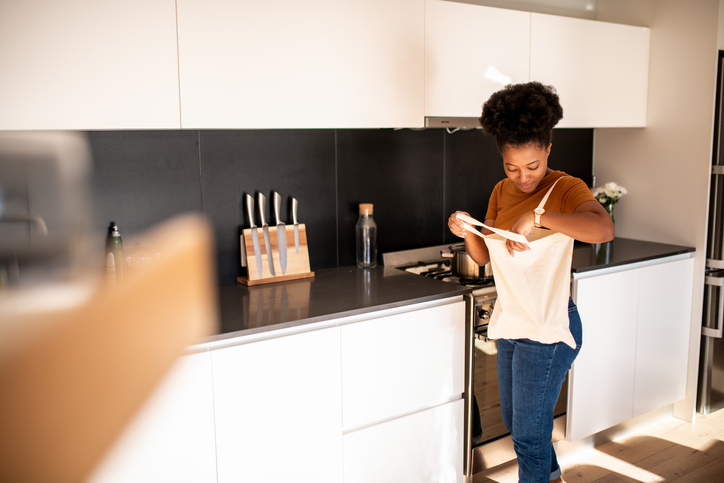
Source: MStudioImages / Getty
Then we’re in the indulgent mindset
Once you have decided to shop away your pain, you have put yourself in that indulgent mindset. “Hey, why shouldn’t I do what feels good, in the moment? I deserve it.” Abandoning restraint feels really good, so then you move onto doing so with food. You wrap up your shopping spree with pizza and French fries and ice cream. You’ve triggered that part of your brain that encourages you to keep doing things that feel good, right now.
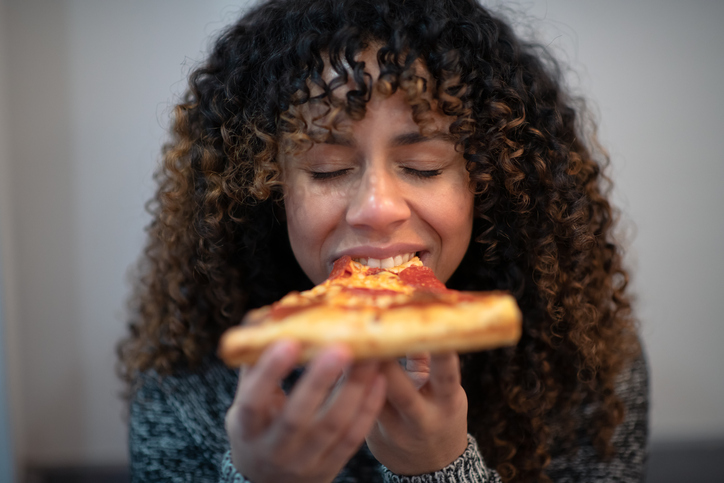
Source: FatCamera / Getty
And we may eat the guilt away
Love MadameNoire? Get more! Join the MadameNoire Newsletter
We care about your data. See our privacy policy.
Then, you feel guilty about that shopping bill. You just dropped $300 on things you didn’t really need. You feel bad. Those feelings of guilt creep in. You don’t like those. What do we do when we feel negative emotions? Sometimes, we eat them. So the eating continues. Eating can also have an unfortunate meditative effect of taking your mind off your worries.
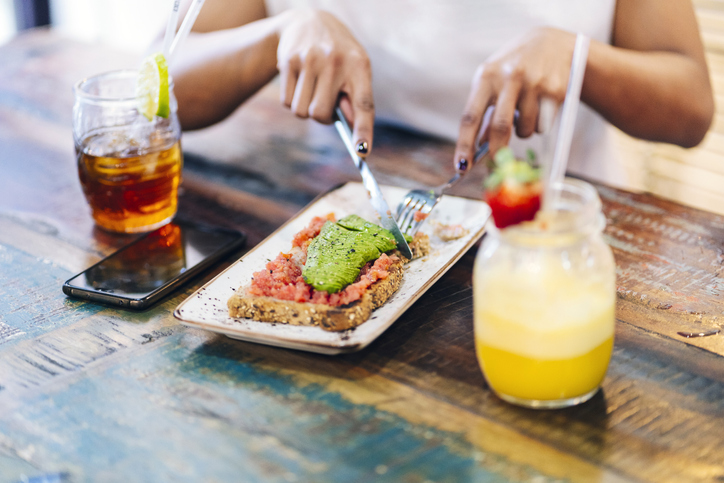
Source: Westend61 / Getty
The out-of-control restaurant bill syndrome
This is a common issue when dining out: once you make that one choice that you said you wouldn’t make – like you do order an appetizer or you do get the $15 cocktail instead of the $5 beer – things spiral out of control. You feel like, “Well, I’ve already ruined my budget for today so I may as well go all the way.” And then you add the dessert. And the second cocktail. And the two sides. It’s spending, and over-eating, all together.
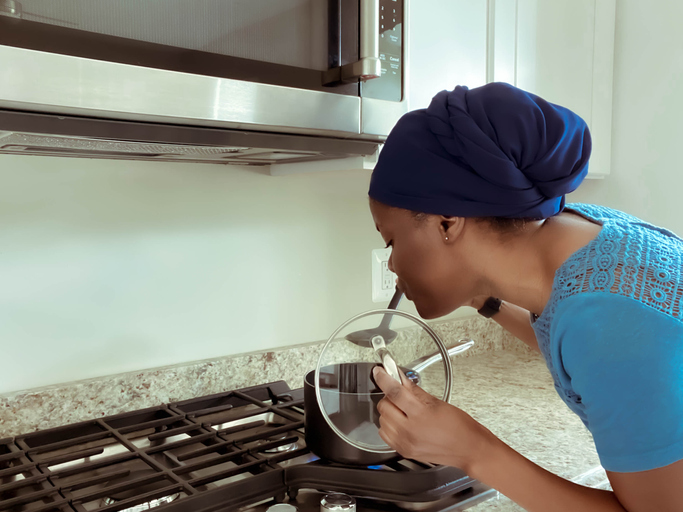
Source: Grace Cary / Getty
A disregard for dollars spent on food
If you buy most of your meals out, you lose touch with what food can/should actually cost. And when you don’t know how much food costs, you don’t cherish every bite. You don’t see it as precious and valuable nutrition. When you cook from home, you start to understand that you can eat for $7 a day sometimes. And when you see those savings start, you want to have more of them. So you don’t overstuff yourself on the dish you made. You eat just enough, so you can have leftovers for your next meal aka stretch those dollars.

Source: LeoPatrizi / Getty
Buying away the food guilt
Like I said, it’s a cycle. If you overeat, you may want to get rid of the guilt surrounding that. And then, you buy some experience to feel better. You get a massage. You get a pedicure. You go to the movies. You want a distraction from the guilt and the bloat, so you buy a distraction. Hence, the spending continues.

Source: Westend61 / Getty
We eat in response to career disappointment
We can often eat in response to career disappointment. If there is career disappointment, that likely means there is a financial disappointment. And then, to comfort yourself after that setback, you may over eat, rather than gather your thoughts and think of how you’ll move forward, past the career setback.

Source: FG Trade / Getty
And eat to avoid career opportunities
Sometimes we also eat in order to avoid opportunity, since opportunity triggers the fear of failure. So instead of going to that networking event, that interview, or that audition, you…stay home and eat. The food gave you an excuse not to put yourself out there, but since you didn’t put yourself out there, you missed out on a financial opportunity.

Source: Marija Jovovic / Getty
A rejection of type-A personalities
You may know someone who feels very in control of her life. She’s a great budgeter. She’s in great shape. When you ask her if she wants a piece of pizza/to spend money on something, she says, with confidence, “No. That’s not in my diet” or “No, that’s not in my budget.” If you feel jealous of this individual, as a way of rejecting that feeling of jealousy, you may behave the opposite way she does. And overeat. And overspend.

Source: picture alliance / Getty
Dining out is rarely the healthier choice
When you dine out, you’re often presented with difficult choices. The healthier item, like the grilled salmon salad, is more expensive. Or there are no healthy items. Or replacing the red meat with chicken costs $6. You feel pressured into situations where you either have to spend too much or eat too many calories. But eating at home is so much cheaper, and puts you in control of what’s on your plate.
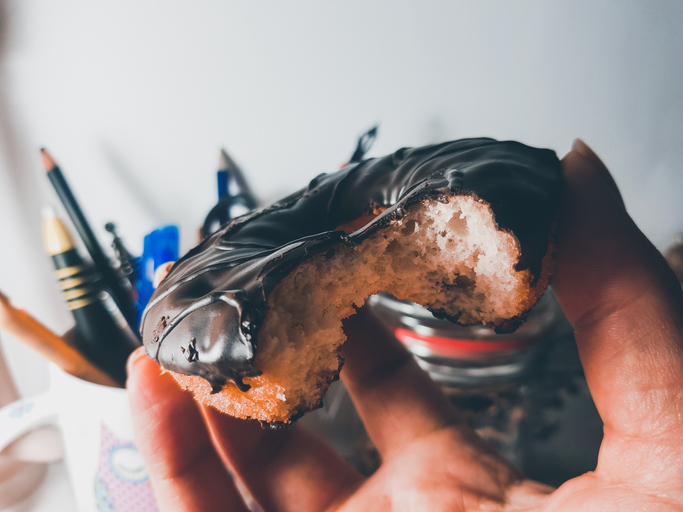
Source: Magdalena Teterdynko / EyeEm / Getty
Self-control is all or nothing
Self-control is a general skill that we can develop. But we can’t pick and choose when we use it. It’s a muscle that must be used often if it’s going to be strong. That means saying no to the double cheeseburger. It also means saying no to the experience that you can’t quite afford. If you don’t have self-control in one area, you won’t have it in the other.

Source: Drazen_ / Getty
It’s a dismissal of tomorrow
If you eat too much or spend too much, there is likely a feeling of, “Tomorrow isn’t guaranteed” or “I’m not going to live today, worried about tomorrow.” So you don’t think, “How will I feel in my body tomorrow, if I eat all these nachos today?” Or “How will I feel about my bank account tomorrow, if I take this $50 cab instead of the bus, now?” The eating and the spending are all under the umbrella of, “I’ll worry about tomorrow, tomorrow.”

Source: RgStudio / Getty
We find like-minded spenders and eaters
We often find like-minded spenders and eaters. We like to be around those who make us feel good about our choices. So if we’re already on the train of over-spending, we find others who do the same. They’ll encourage you to buy that designer bag. And we’ll find other over-eaters, who will pressure you to share the heavy appetizer with them. But they are often also one in the same: the heavy spenders are also heavy eaters, and visa versa.

Source: martin-dm / Getty
How do you optimize your time?
When you think about optimizing your time, you naturally lose weight and make more money. Like when you think, “Okay, I have a half hour before I have to go. Do I want to spend it eating cake? Or do I want to spend it sending out five more cold-call emails to get leads for my business?” Sometimes, the choice is that simple: between eating, and moving your career forward.
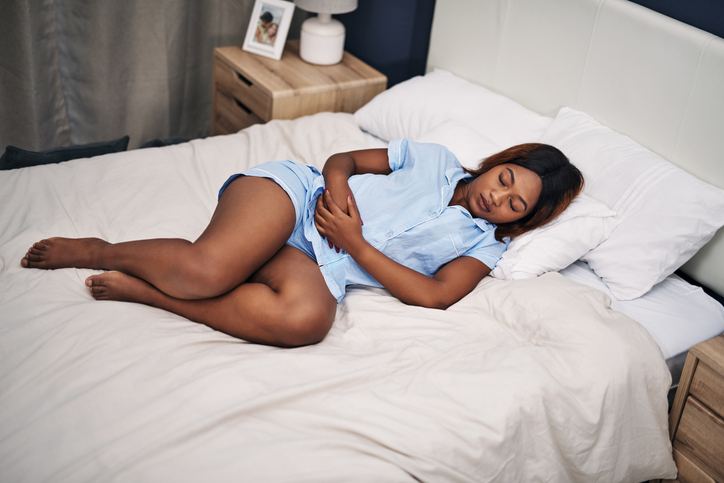
Source: PeopleImages / Getty
One makes us feel deserving of the other
These issues with self-worth feed on each other. We can feel, “Well, I’m overweight, so I deserve to be broke. It’s not like I want to take myself, looking like this, anywhere special.” Or “Well I’m broke so I deserve to be fat. I haven’t worked hard enough to be hot.” It all ties into not believing that you deserve good things and so you don’t do good things for yourself, like budget or exercise.
-

She Tried It: Inahsi Naturals Aloe Hibiscus Leave-In Conditioner & Detangler
-

Meet Dominique Fils-Aimé, The Haitian-Canadian Star Redefining Jazz For A New Generation: ‘This is My Vision' [Exclusive]
-

Cooking With Purpose — How Brittney Williams Honors Her Caribbean Roots Through Food
-

8 Famous Lesbian Women Who Were Married To Men



